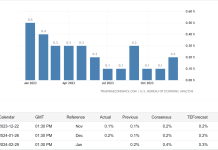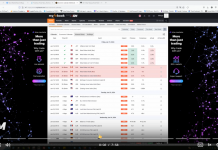 Failed healthcare bill hasn’t destroyed markets so far this week with the S&P 500 (+0.73% yesterday) now back at the highest level for just over a week after Banks yesterday (+1.56%) rebounded strongly for the sector’s biggest gain since March 1st. The Dow (+0.73%) also brought to an end a run of 8 consecutive daily losses and the longest run since 2011. It is worth noting however that the loss during that period was only -1.91% (of which most came last Tuesday) so yesterday’s rally has already recovered nearly 40% of that. At the same time the VIX also plummeted to a new one week low last night after dropping nearly 8% to 11.53. That is having touched the highest level since November just two days ago.
Failed healthcare bill hasn’t destroyed markets so far this week with the S&P 500 (+0.73% yesterday) now back at the highest level for just over a week after Banks yesterday (+1.56%) rebounded strongly for the sector’s biggest gain since March 1st. The Dow (+0.73%) also brought to an end a run of 8 consecutive daily losses and the longest run since 2011. It is worth noting however that the loss during that period was only -1.91% (of which most came last Tuesday) so yesterday’s rally has already recovered nearly 40% of that. At the same time the VIX also plummeted to a new one week low last night after dropping nearly 8% to 11.53. That is having touched the highest level since November just two days ago.
As we discussed in yesterday’s commentary, many here at DB think that Trump trades had already been priced out to a large degree and therefore the disappointment over Friday’s news may be limited. Firm global growth being the most important factor in where markets are trading. Trump reforms are still very important though especially if global growth slows. Without a big reform package the US is unlikely to be able to pick up the slack if any slowdown occurs. So we certainly don’t want to downplay the political events but their ramifications may not be immediate.
On that note it was interesting to see the surge in yesterday’s consumer confidence print in the US to 125.6 (+9.5pts) in March and the highest since December 2000. The present conditions gauge also increased to the highest since August 2001 at 143.1 and a measure of consumer expectations for the next six months hit the highest since September 2000 at 113.8. It is worth noting however that the sample period of data being collected had a cutoff date of March 16th and obviously prior to the healthcare bill debacle. While the recent trend is clearly encouraging (largest five-month gain since 2011-12) it’s probably worth waiting until next month’s data to see how much of impact last week’s developments have had, if at all.
This is only a snapshot of today’s Deutsche Bank Macro Commentary. Try out free trial of FxWatcher service and read the rest of it!
The data did however help the Greenback to spike higher with the US Dollar index closing up +0.55% for its strongest day since March 1st. 10y Treasury yields also rose 4bps to 2.419% and are back to Friday’s closing levels while Gold (-0.24%) retraced a bit. Comments from the Fed’s Fischer saying that two more rate hikes this year “seems about right” probably also contributed to some of those moves.
DB’s Washington expert Frank Kelly yesterday hosted a client call on the political implications of last week’s events. He suggested that the surprise withdrawal of the Republican healthcare bill on Friday is a sign of the continued division within the Republican Party and is perhaps a precursor to growing political and policy risks in the US. Even before considering the difficulties involved in passing President Trump’s tax reforms, there exists a very real possibility of a government shutdown on April 28 when the current continuing resolutions set to expire. There is a significant chance that the Freedom Caucus will reject a new continuing resolution due to their opposition to the continued funding of Planned Parenthood and Obamacare, while Trump’s spending plans for a border wall will see opposition from both Democrats and Republicans in the Senate.
Frank estimates the probability of a government shutdown at roughly 40% and notes that the next 2 weeks will be critical to watch. Beyond the risks of a government shutdown, policy uncertainty continues to manifest itself in the form of questions surrounding Trump’s tax reform bill: Frank expects that the controversial Border Adjustment Tax (BAT) will not even make it into the final bill (at least not in its current form) and that the new corporate tax rate will likely be closer to 25% rather than the expected 15-20% range. Also despite the failure of the healthcare bill there is unlikely to be any acceleration in the proceedings on tax reform to fill the gap.
The bill remains likely to go to Congress sometime in the first two weeks of May, and will likely only be picked up by the Senate in September. Given these developing uncertainties, Frank suggests that markets should downgrade their expectations of progress going forward.
















